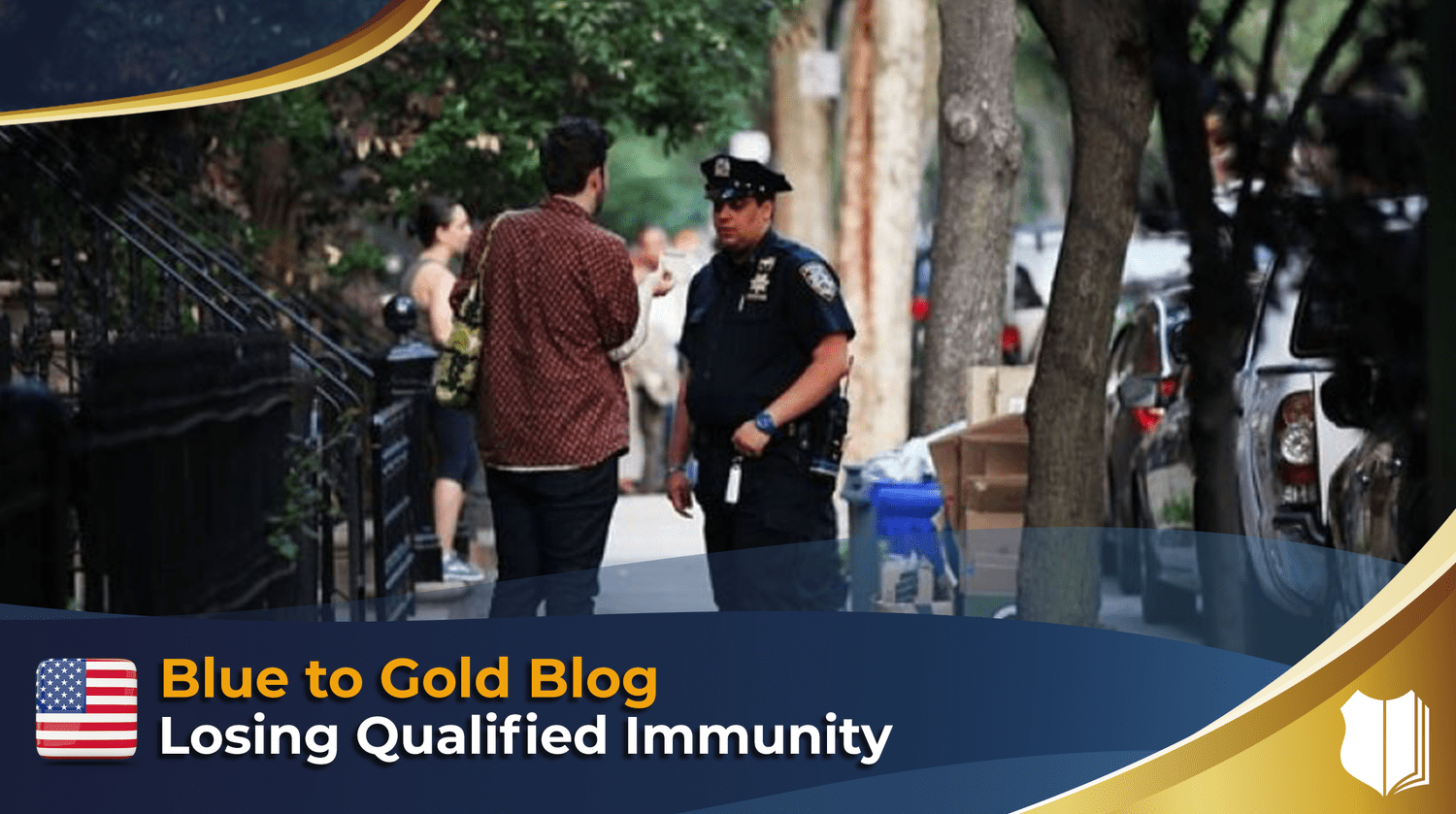Today’s question is so important. It’s important to every single officer watching my videos and reading my blog. The question is, What happens if we lose qualified immunity?
It’s on your mind, I know it is. And if you’ve already lost qualified immunity in some of the states like Colorado, New York and New Mexico, then what does that mean?
Okay, let’s just get down to it. What is qualified immunity? Qualified immunity is a judicially created doctrine that protects officers from lawsuits when the issue is not clearly established under the law. In other words, officers oftentimes make decisions in the field, constitutional decisions that are not quite black and white.
Now, the US Supreme Court has not addressed it, their Circuit Court has not addressed it, their state Supreme Court has not addressed this issue. So what are cops supposed to do? Say, “Timeout suspect. Look, I’m going to timeout for a second. I’m gonna go seek judicial approval. But what I’m going to do, and I’ll be back…” No, they can’t do a timeout.
So qualified immunity is there to protect officers (except the blatantly incompetent), from lawsuits against them for situations that are not clearly established under the law. In summary, to qualify for qualified immunity, to get to be immune from a lawsuit, the qualifications are this. Number One, did you even violate the Constitution? That’s one question that the courts can ask.
Maybe they say, “Look, we know it’s unclear, but we actually find that the officer did the right thing.” So boom, we don’t need qualified immunity. The officer actually was acting in accordance with the Constitution.
Number Two, even if the court found that the officer was conducting or doing something that was unconstitutional, the next question is, “Was the law clearly established at the time?” If the law was not clearly established, then it’s not fair to hold the officer liable for money damages, when it’s not even clear that they violated it at the time of the act.
So clearly established law comes from, again, the US Supreme Court, and your circuit court, and your state Supreme Court. So for example, if you’re in Texas, and you do something, and the Illinois State Supreme Court has found that what you did violates the Constitution, does that apply to Texas officers? No, that is not going to eliminate qualified immunity for Texas cops.
Maybe the court in Texas might say, “Looking at this Illinois case; from now on, we’re going to rule that this is unlawful under the Constitution.” So that’s what qualified immunity is.
Now, if we get rid of qualified immunity, then what happens is, we get rid of the clearly established part. All we have to do now, if we get rid of qualified immunity is simply ask, “Did the officer violate the Constitution even if he or she wasn’t on notice?” The answer is yes, liable. That’s what this is all about. So then, if the officer violates the Constitution, even if he or she wouldn’t have known, they’re liable.
Now, let’s go to the next step, which is; what is the likely outcome? Okay, so a lot of officers believe that if they get rid of qualified immunity, they could lose their house, they could lose their pension. The good news is; probably not.
I know overall, this is a pretty scary thing, but probably not. And here’s why. Because the people passing these laws to get rid of qualified immunity, they don’t want you to pay. Not personally. They want your agency to pay. See, this a money grab, getting rid of qualified immunity. It makes it easier, much easier, to reach into the pockets of the taxpayer.
That’s a big hurdle for them, right? These people who sue cops have a huge hurdle; qualified immunity. They can’t sue you, if it’s not clearly established. They’re basically making case law. So, at the end of the day, when they go to the legislature and lobby for this, and they have their backroom deals, they’re not saying, “Hey, please, please, pretty please
give us this law to get rid of qualified immunity, and pretty please, let’s have John Doe, the officer, personally liable, because we really want him to pay that million dollar judgment.”
Many lawsuits, if you’ve lost qualified immunity, are going to be in the hundreds of thousands of dollars in legal fees, damages, and so forth. So do you think officers can afford that? Most cannot, right? I mean, Don Johnson probably has little bit of bread in his pocket. He’s driving around a in Ferrari and stuff.
But the answer is no, most cops do not have enough money to cover the judgment.
So these trial lawyers are making sure that in the bill, the taxpayer is ultimately responsible. Let me give you an example: Colorado, SB 217, the bill that got rid of qualified immunity in Colorado. Did you know that it says in there, that even if the officer is found liable, as long as he was not willful, he did not willfully violate anybody’s rights, the taxpayer is on the hook, not the officer.
Now, it says, “Even if the officer was willful, did willfully violate someone’s rights and should have known that this was a violation; 25,000 dollars.” Is that chump change? No. But that’s not losing your house kind of money. I mean, you could put up a GoFundMe, and you’re probably going to get that. So even in Colorado, the maximum out of pocket expense is $25,000.
Finally, the officer says, ‘Okay, so that’s where we’re at. That’s what qualified immunity is; violating the Constitution, it’s clearly established, you should have known better. To get rid of that, all we have to do is find a Constitutional violation, but you’re probably not going to pay.”
But that’s still not a good thing. At the end of the day, we don’t want officers having a lawsuit in their name and being found liable, because that’s just not good for the taxpayer, that’s not good for the officer’s well-being and mental and physical health, it’s not good for their career. You’re walking around with this black cloud over your head that you violated somebody’s rights. And that’s going to stunt your professional growth.
Now, the officer says, “What are the best strategies to protect ourselves and avoid future lawsuits?”
One is to work in a state that protects officers. I mean, there has to be a repercussion for states like Colorado, hammering their cops for trying to do a thankless job, and then not even getting qualified immunity. There has to be a repercussion to that.
What that repercussion is, you decide. I just hope that people going into this business of becoming cops, if they have a choice where they can live, my advice is don’t become a cop in a place that doesn’t have your back. It’s just like going into a job and the employer, says, “Hey, welcome to this XYZ profession. By the way, if you mess up, we’re gonna throw you to the wolves. Do you want to start on Monday?” I’ll pass!
The next thing is, know the law. If you are working in a state like Colorado, New York, and so forth, I’m with you. I know you just can’t pick up and move at the drop of a hat. I understand that. And I’m not saying that you should retire on duty.
But I am saying that if you’re going to do this job, you’ve got to have a good head on your shoulders, You have to know the law, you have to use good discretion. You can’t just kind of fly by wire or braille anymore. You’ve got to know the law.
So in order to protect yourself, I’m not going to recommend getting an insurance policy. (Maybe that is what you should do.) But the better recommendation is to know the law, so that you’re not violating people’s rights. You’re not even getting to that qualified immunity question because you’re not violating people’s rights to begin with. Know the law and don’t violate the rights of anyone! We’ll leave it there.
Now, here’s a plug for my stuff. I have plenty of free classes every single week. I have plenty of videos on YouTube. Watch them. I have plenty of classes in person online, on demand. Take those classes. That’s what I’m contributing to your success. Take other people’s training, don’t just take mine. Take other people’s stuff, because this is too important to try to hopefully be lucky and go through this career. There is no luck anymore. It has to be competence. And that’s what I have for you.
Also take advantage of me. I am here for your legal survival. I am here to help you learn search and seizure. And if you don’t want to reach out to me and ask me questions, and you do have questions that’s on you. But I’m here for you, paid or not paid. Go to my classes, don’t go to my classes. I’m here for you because I care about your survival. And I don’t want to see you losing your home or anything like that.
Even if you live in a pro law enforcement place, you’ve got to get your questions answered. All right, great question. I hope you got something out of it. Until next time, my friends, stay safe and keep what you’re up to doing.
When it comes to law enforcement training, we are the gold standard.
Visit blue to gold.com or call 888-579-7796 to learn more about our training books and free webinars.











